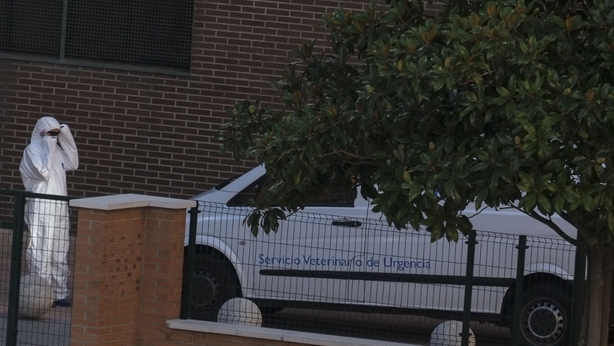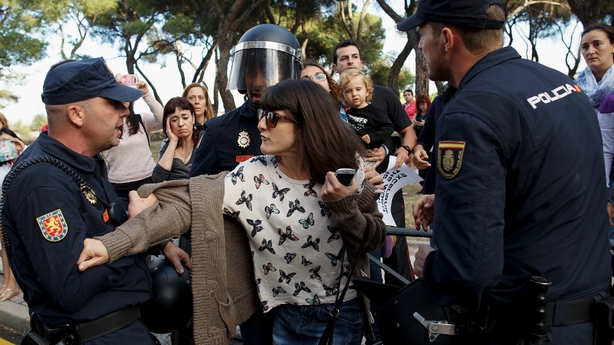US Ebola patient Thomas Eric Duncan has died four days after being admitted to hospital in Dallas.
Mr Duncan arrived in Dallas from Liberia two weeks ago and was admitted to Texas Presbyterian Hospital at the weekend.
Texas state health officials said they are monitoring ten people who had close contact with Mr Duncan and 38 others who came into contact with that group to see if anyone had developed signs of infection.
So far, no one has shown any symptoms, health officials said.
Mr Duncan was in contact with a known Ebola patient before he left Liberia last month.
He did not have a fever when he left the country on 19 September, but began to feel sick on 24 September after arriving in Texas.
He was initially sent home when he first sought medical care, leaving a four-day span when he was sick and contagious while in contact with others.

A hospital spokesman said: "It is with profound sadness and heartfelt disappointment that we must inform you of the death of Thomas Eric Duncan this morning at 7.51am."
"Mr Duncan succumbed to an insidious disease, Ebola. He fought courageously in this battle," Wendall Watson said.
"The past week has been an enormous test of our health system, but for one family it has been far more personal. Today they lost a dear member of their family," said Texas health commissioner David Lakey.
"They have our sincere condolences, and we are keeping them in our thoughts."
He said that the medical team in Texas has "provided excellent and compassionate care, but Ebola is a disease that attacks the body in many ways".
The virus is spread through close contact with the bodily fluids of an infected person, or by touching the corpse of a person who has died of Ebola.
Elsewhere, Spanish health officials have said the nurse diagnosed with Ebola may have contracted the virus after touching her face with a glove as she removed her protective suit after treating an infected patient.
They said Teresa Romero entered the room of Spanish missionary Manual Garcia Viejo twice - once to clean him and the second time after he died on 25 September, just days after being repatriated from Sierra Leone.
Dr German Ramirez at Madrid's La Paz-Carlos III hospital said Ms Romero told him she remembers she touched her face with her gloves as she removed her protective suit after leaving the quarantine room at the hospital where the priest was being treated.
"She thinks she remembers that it was during the first time she entered the room but we should continue to look into it," he told reporters gathered outside the hospital.
"It seems like it was the gloves. The gloves touched the face," Dr Ramirez said, adding the infected nurse had authorised him to speak to the media.
"It is possible that this was not a mistake as such. It could simply be an accident and logically, probably, she could not remember at the beginning because of the state of her health."
Ms Romero had said in an interview published in El Mundo today that she had "no idea" how she could have contracted the virus.
Six people have been admitted to hospital in Madrid since Ms Romero was diagnosed with the disease on Monday in the first case of transmission of the disease outside of Africa.
In the latest case, a nurse was quarantined at La Paz-Carlos III hospital this morning as a precaution, a spokesman for the hospital said.
Another nurse was admitted to the hospital with a fever last night and put in quarantine for monitoring, he added, confirming Spanish media reports.
Three other people had been placed in quarantine at the hospital for monitoring since Ms Romero was diagnosed.
Among the six people hospitalised are the woman's husband, who is considered "high risk".

Officials said they were monitoring 52 other people, mostly health staff who had been in contact with the infected nurse, as a precaution.
Health Minister Ana Mato said that there were no signs that any of the woman's colleagues had also become infected.
"At the moment we have no evidence that any of them have any symptoms," she said as she arrived in parliament.
A Spanish court ordered that the dog owned by Ms Romero - Excalibur - be put down.
Protesters tried to save the dog and there were scuffles with police as it was removed from Ms Romero's apartment.

Two people were injured as officers carried away some of the protesters who blocked a veterinary van from entering the gated apartment complex.
Just 40 minutes after the mixed breed dog was removed, Madrid's regional government said it had been put down "to avoid suffering".
The regional government obtained a court order yesterday to euthanise the dog, saying there was a risk it could be a "carrier of the virus even without showing symptoms".
US to toughen Ebola screening at airports
Elsewhere, US health officials said today they would unveil within days new screening procedures for Ebola at the country's airports to address public concern over the possibility of an outbreak.
The move would go beyond the Centers for Disease Control and Prevention’s efforts to augment screening for travellers leaving Ebola-stricken countries such as Liberia.
The CDC had viewed this as the best way to address the potential spread of the virus.
However, the diagnosis of the first Ebola patient on US soil last week has strengthened calls from lawmakers and some health experts to introduce stronger measures in this country.
Screening passengers upon arrival in the United States could detect passengers, who may have developed a fever in flight, but will also pose new challenges to border control officers and flight crews, industry experts said.

